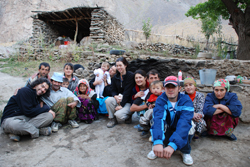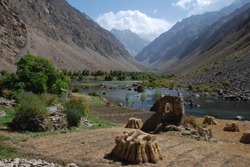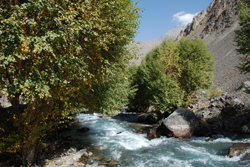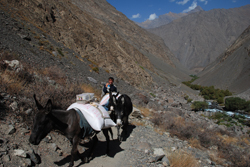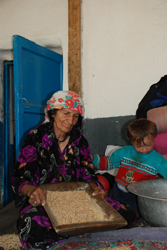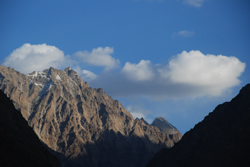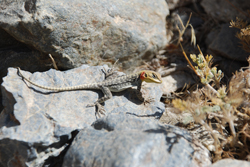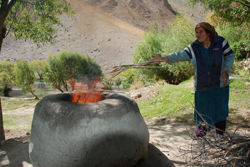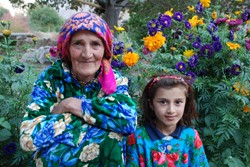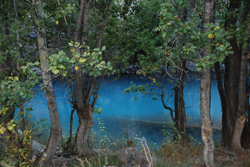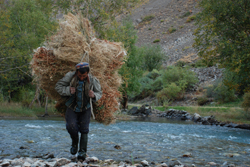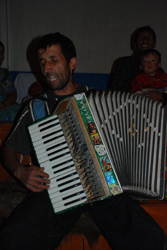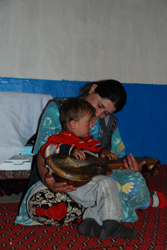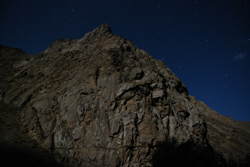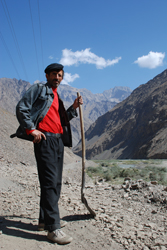Geisev: A Fairy-Tale Valley
18 September, 2008, 03:38 pm in "Tajikistan"
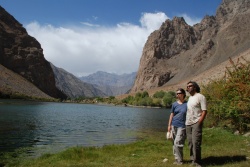 We left early the next morning for Geisev. A traveler we met at the lodge, said Geisev was like the Shire in the Lord of the Rings-- everything seemed small and Hobbit-like. I hadn't paid too much attention to this remark, but it popped into my head as we were walking through the village. It was a tiny place occupied by 7 families, a 2 ½ hour walk up the valley from the road.
We left early the next morning for Geisev. A traveler we met at the lodge, said Geisev was like the Shire in the Lord of the Rings-- everything seemed small and Hobbit-like. I hadn't paid too much attention to this remark, but it popped into my head as we were walking through the village. It was a tiny place occupied by 7 families, a 2 ½ hour walk up the valley from the road.The fields are small and orderly, some lined with flowers or bright red colored plants. There are hay stacks which are actually more hay bundles set in neat rows in the field. There are short stone walls and little canals transporting water through the villages. Trees line the river making delightful patches of shade. Apple laden trees drop apples into the canals which transport them like a fleet of little round yellow ships down stream. The canals fill the villages with melodic sounds of water. The mountains which tower above the villages in Mordor-like harshness make the valley seem even smaller and more cozy.
The villages (we visited 3 in the valley)also reminded me of the segment in Akira Kurusawa's Dreams entitled, “The Village of the Waterwheels”, in which the main character comes to an idyllic village where everyone lives close to nature and everything is powered by water wheels. The villages of Geisev are kind of dreamlike. You cross a vertigo inducing suspension bridge above the Bartang River, then climb uphill over sections of valley completely covered by rock slide scree. After an initial fearsome pile of rocks, the path follows a river lined with gentle trees, beginning to turn gold. Sometimes the river rushes in white cascades. Other times it meanders through shady groves of trees.
A bridge crosses the river and the path rises a little bringing you to stone walled fields and the first house of Geisev. Unlike the village in Dreams, the villagers don't have waterwheels. There are a couple solar panels but electricity is generated for special occasions using a generator running on gas. The solar panels are not able to provide too much energy due to the late sunrise and sunset due to the high mountains. I did notice some rusted remains of waterwheels here and there suggesting at one point someone tried to institute some evidently non-sustainable small scale hydroelectric power.
Though the people of Geisev, unlike in the Shire, don't eat 5 meals a day, guests to the valley, easily could if they ate everything presented when offered tea. At every village in the valley, we were invited for tea which was served with tomatoes, bread, cookies, candy, grapes, and chickpeas. At the first village, where we are staying, we rested on the tea bed and enjoyed the break. While chatting we learned that Rowshan was their first Iranian visitor. They had him sign their guest book later. We left our bags at the guest house and started walking up towards the next village passing places where landslides have blocked the river's flow creating lakes. Up ahead of us, seemingly at the end of the valley, was a huge snow capped mountain. As Rowshan was looking at it he noticed a huge cloud caused by an avalanche. The mountains are huge and seem permanent but apparently are still moving.
Though the people of Geisev, unlike in the Shire, don't eat 5 meals a day, guests to the valley, easily could if they ate everything presented when offered tea. At every village in the valley, we were invited for tea which was served with tomatoes, bread, cookies, candy, grapes, and chickpeas. At the first village, where we are staying, we rested on the tea bed and enjoyed the break. While chatting we learned that Rowshan was their first Iranian visitor. They had him sign their guest book later. We left our bags at the guest house and started walking up towards the next village passing places where landslides have blocked the river's flow creating lakes. Up ahead of us, seemingly at the end of the valley, was a huge snow capped mountain. As Rowshan was looking at it he noticed a huge cloud caused by an avalanche. The mountains are huge and seem permanent but apparently are still moving.
A lot of the time the path led over rock fall scree which made a sound like wind chimes beneath our feet. On some of the rocks-- gray with reddish orange spots of lichen, we saw gray lizards with lichen orange spots on their necks. Gray grasshoppers revealed bright purple wings as they hopped. Swallows wheeled over the first lake catching bugs.
In the second village, home to 8 families, the women were busy preparing bread in a fire-powered clay oven. We were asked to tea and fist declined but when we learned the fresh bread would be ready in about ½ hour, we agreed to stay. We watched one woman feed branches into the oven creating a roaring but quick burning fire. When the branches were reduced to coals, other women brought round flat loaves of bread dough. They painted one side with water then pressed it onto the side of the oven. The oven held 4 to 5 loaves. Then they covered it. About ½ hour later, we sampled the fresh bread with black cherry preserves, a specialty of the region and also used for treating the flu.
The third village seemed even smaller than the previous 2. It was the most peaceful. One path was lined with flowers. Rowshan stopped to photography a woman and her granddaughter. Both were wearing flowered dresses and stood near the flowers. The woman invited us for tea, but since we'd just had tea, we promised to return on our way back down the valley.
The next lake we came upon was deep turquoise which seemed to almost glow against the green, yellow, and orange of the leaves. It was a beautiful and enchanted place. At this point we turned back, not wanting to be caught hiking down the path in the dark. We stopped at the third village and had tea with Zahro, the woman who had invited us. When we left, she asked our names and when Rowshan said his, she wished “enlightenment” (a pun on the meaning of Rowshan's name, light) for us both.
On the way back to the 1st village, we watched the light changing on the mountains as the sun dipped behind them. Close to the village we came upon one of the men carrying a huge load of hay. He was bringing hay in from the fields. He told us he was going to bring one more load and then catch up with us. Hay gathering seems to be the main activity for the men at this time of the year. We saw several men carrying giant loads of hay on their backs.
At the village, we had soup for dinner. Then we all retired into the guest house for a performance of Pamiri music on accordion and drums. 3 men played and I danced following the movements of 2 of the women. Then Rowshan played a couple Persian songs on the accordion then joined in on the drums a bit. It was a fun evening with lots of singing, dancing and music. The light was from the generator so as things slowed down, we decided to sleep so the electricity could be turned off.
This morning we didn't start as early as we'd planned but quickly descended the valley. On the road, we saw Abdullah who was shoveling stones off the road. He explained that one person was in charge of clearing 10 km. We sped on to Yemts where we hoped to catch a mashrutka. We waited for a bit but nothing came. Then an MSDSP jeep which gave us a ride to Khorog.
[ View 1 Comments
|
]
Comments
michelle tavakoli -
posted on 3/23/2009
WHAT VIVID COLORS, SUCH A BEAUTIFUL VILLAGE AND PEOPLE IT SEEMS. SO KIND AND TRUSTING. I LOVE THE BRIGHTNESS OF THEIR CLOTHES AND THE SCENERY IS AMAZING TOO. A FUN NIGHT OF MUSIC AND LAUGHING IT SEEMS.


